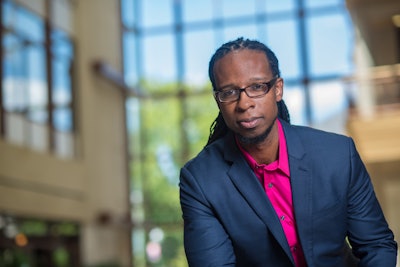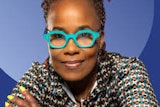By early March, SARS-CoV-2, a novel coronavirus, had touched off a pandemic. Those studying the virus stoked the claim that COVID-19, the respiratory infection the virus causes, is indiscriminate in whom it tackles and kills. Looking across racial and ethnic groups, and moving from Hollywood A-listers to seniors in nursing homes, to shelf stockers at the local Walmart — no one is immune.
But the coronavirus is not the “great equalizer.”
In the early days, as the U.S. stared a grave and unprecedented public health threat in the face, it wasn’t clear who was getting tested, who was infected and sick, who was hospitalized and who has died. But Dr. Ibram X. Kendi, who in 2017 launched the Antiracist Research and Policy Center at American University, had “a hunch” that the COVID-19 outbreak wasn’t affecting all groups the same way. No doubt, Kendi, a historian of racism, considered that race and racism would be at the root.
 Dr. Ibram X. Kendi
Dr. Ibram X. KendiCOVID-19 has cast an old story of health disparities in a new light. Decades before the coronavirus outbreak, physicians, researchers, advocates and experts concluded that social determinants of health and health disparities are real. That’s why in April, Kendi, “a student of health disparities,” pointed to those as likely causes for COVID-19’s unequal toll. Although data was limited, worrisome to Kendi was what the numbers were beginning to show about the vulnerability of African Americans and other people of color to the virus.
“We anecdotally began to see sizeable numbers of Black and Latinx people dying and being infected,” Kendi remembers. These were people who likely didn’t have the luxury of staying safely at home and social distancing in the workplace. Blacks and other people of color were also likely suffering with pre-existing health conditions and chronic illnesses and confronting other vulnerabilities that put them at higher risk for infection and death from this coronavirus compared to other groups.
Kendi’s hypothesis proved true. And the evidence is mounting. African Americans are being pummeled the hardest by the pandemic. Although 13% of the population, African Americans account for 25% of COVID-19 deaths where race is known, as of May 2020. This means Black people are dying at a rate nearly 2 times higher than their population share, he revealed.
This is a tragic reality that hits home for Kendi who is surviving metastatic cancer. “I know what it’s like to suffer from an extremely debilitating disease and to wonder whether you’re going to live another day,” he told Diverse.
As Kendi recalls, governmental agencies including the Centers for Disease Control and Prevention (CDC) initially didn’t post racial data for COVID-19 on its website. And at the time, neither did national, high-profile systems tracking the virus outbreak in the U.S. Likewise, in April, few states, public health officials, or private labs were releasing their data by race.
The urgent call for race data
A contributor to The Atlantic, Kendi became an early, unwavering voice on the need for COVID-19 demographic data and transparency. He used the magazine platform and a series of essays, some personal, to respond to the silence and data gap.
Soon, Kendi’s voice was among an urgent, national chorus that included political, Black, legal and community leaders. They demanded that federal and state governments and public health departments release racial and ethnic data collected on COVID-19 and make testing, diagnosing and care for Blacks and other people of color a priority.
The failure of the CDC and other federal agencies to be a needed repository for comprehensive, racial demographic data on COVID-19 has frustrated Kendi, and so has the growing impact of the virus on communities of color.
Without such data, “the federal government can’t step in and partner with those local areas to provide relief, to create policy, to stem the tide of infection, and end death rates. When they sit back and allow racial disparities to persist,” Kendi urges, “they are being racist.”
Tracking COVID-19’s racial impact
That’s when Kendi got proactive, developing in April what didn’t exist: a national racial data tracking system to develop, record, analyze and regularly update racial data on the pandemic in the United States. The result is the COVID Racial Data Tracker, a collaboration between his Antiracist Research and Policy Center and the COVID Tracking Project housed at The Atlantic. For nearly three months, the COVID Tracking Project has been a go-to source of national testing data that’s been used by Johns Hopkins University, the White House and others.
“We want to collect the most comprehensive data sets available so that we can report and analyze that data and transform it into story form so that people can understand COVID-19’s impact on people of color,” says Kendi of the tracking system and the data that he hopes will “impact public health policy, transform local communities, help create health equity in real time, and live on, even in the aftermath of this pandemic.”
Racial data reporting is on the upswing, wrote Alexis Madrigal, a staff writer at The Atlantic and founder of the COVID Tracking Project, which is partnering with Kendi’s center. “When we began, fewer than 10 states and zero territories reported any race or ethnicity data related to COVID-19 testing or outcomes,” Madrigal wrote. As of May 2020, according to the Project, 48 of 56 states and territories are reporting cases by race and ethnicity and 42 of those states and territories are reporting racial and ethnic data on deaths.
At the same time, Kendi says, “there are still some states that haven’t released infection or data on deaths. And for others, state race and ethnicity data are limited to Black and White people, not “Latin X, or Native people, Asian or Native Hawaiian people. What we are also finding is that the overwhelming amount of case data that has been released by states is unknown, meaning that in 80% of the cases, they don’t know the racial demographics of those who test positive for COVID-19. They are only able to release 20% of the data and that 20% shows racial disparities,” Kendi adds.
“For me, what racial data has long been able to demonstrate has been racism itself. I’m hoping that this [COVID-19] racial data tracker will be able to show where there are racial problems that need to be solved in real time, during this pandemic.”
This article originally appeared in the June 11, 2020 edition of Diverse. You can find it here.















